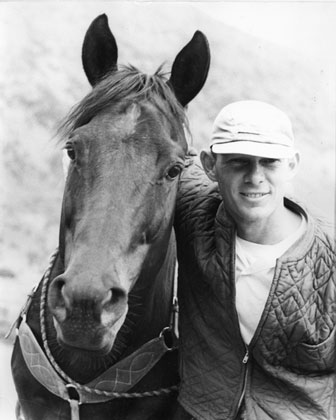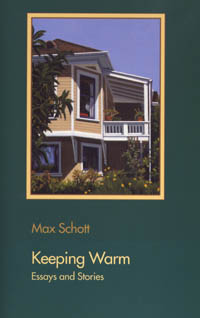Writer Max Schott Reads at UCSB
Poetry in Prose

I got to know Max Schott in the mid-1970s when I started teaching literature classes in the College of Creative Studies (CCS) at UCSB. This was just before he published his first book, Up Where I Used to Live: Stories. By then, Max had been teaching at CCS for nearly 10 years, beginning soon after Marvin Mudrick founded the college in 1967. Over the last 30 years, I have become Max’s friend, I’ve read and taught his books, I’ve shared an office with him, and I’ve been a guest many times at his home on the upper Eastside where he and his wife, Elaine, have lived since 1972. What I have to say in this brief article comes from these experiences.
Appraising Max as a writer is easy, because Walter Clemons, Robert Kirsch, and Robyn Bell have already done it, and all I have to do is quote them: “He is a genuine artist, with a calm, affectionate knowledge of a particular world and the ability to fix it indelibly on our imaginations” (Clemons, Newsweek); “He is a brilliant writer” (Kirsch, Los Angeles Times); “[He is] a world-class writer at the height of his powers” (Bell, referring to Keeping Warm, Amazon.com). Lacking in moderation? Yes. True? Yes. And the bewildering thing about this extravagance and truth is how casual, how effortless all of Max’s writing appears to be.

We shouldn’t fool ourselves. That first book, Up Where I Used to Live, a wonderful collection of stories, was published in 1978, and his most recent book, Keeping Warm: Selected Essays and Stories, in 2004. In between, he published two novels, Murphy’s Romance (1980) and Ben (1990). These are short by almost anyone’s standards (averaging 175 pages), and Max worked for years on each one, not letting them go until he had made them seem effortless, as his favorite author, Chaucer, did when he wrote at the end of Troilus and Criseyde, “Go, litel book :”
Max is known best for Murphy’s Romance, his first novel, which was made into a movie about as far removed from the book as moonshine is from the moon. The book is very fine, and the novel that followed it, Ben, is even better. Ben comes more directly out of Max’s life, telling the story of Max, a boy estranged from his own father with his “big oblivious brain” and infatuated with a horseman and rancher named Ben, whose passions appeal to Max the boy. It is a beautifully written novel with characters that are all good in their individual ways and intelligent in varying degrees. Each time I read it, I am reminded of Max the man, who is as circumspect as anyone I have met.
A friend in common of ours, Jerry Chalmers, once said to me, “Max knows more about human relationships than anyone.” Extravagant? Maybe. True? I think it is, and that knowledge, based on experience, enters into everything he’s written. It’s the burning core of his stories and novels. Even when Max is making things up, as when he has his aunt marry his father after his mother dies in Ben, his characters behave exactly like real people, and what they say sounds like something Max overheard and jotted down; their feelings are always true to the events that give rise to them.
From the beginning, critics have called Max’s prose “poetic,” and they are right if poetry is clearness, understanding, true feeling, making a great deal happen in a short space, humor, decency, and never frills or making a splash-a rare combination of virtues in a writer at any time, in any place. It is our good luck to have such a writer living in Santa Barbara.
4•1•1
On Wednesday, November 14, from 4-5 p.m. at The Old Little Theater, UCSB College of Creative Studies, Max Schott will deliver a talk titled How I Began to Write, and will read from his work as part of the CCS Literature Symposium. For more information, call 893-2364 or visit ccs.ucsb.edu.



